[SDU] UDoP: Unifying Vision, Text, and Layout for Universal Document Processing
[SDU] UDoP: Unifying Vision, Text, and Layout for Universal Document Processing
- paper: https://arxiv.org/pdf/2212.02623.pdf
- github: https://github.com/microsoft/i-Code/tree/main/i-Code-Doc
- CVPR 2023 accepted (인용수: 45회, ‘24-04-10 기준)
- downstream task: Semantic Entity Recognition, Question & Answering, Information Extraction, Table QA/NLI
1. Motivation
- Doucment Understanding은 classic vision-language와 다른 특징이 존재한다. 즉, 2D spatial layout이 존재한다.
- Document에 주어진 3가지 modality, 즉 image, text, 그리고 layout간의 강한 correlation을 잘 활용하여 하나로 통하는 model을 만들 수 있지 않을까?
- 기존 연구들은 image를 배제하고 text와 layout (2D positional embedding) 만 사용하는데, image 정보를 활용할 수 있지 않을까?
- Document Understanding의 또다른 특징인 다양한 domain이 존재한다는 것이다. 이처럼 diverse한 text, image, layout을 효과적이고 효율적으로 학습할 수 있는 방법은 없을까?
- text vocabulary에 추가적으로 layout (discretized bounding box)를 추가해보자!
2. Contribution
-
Vision, text, 그리고 layout을 통합한 document AI UDoP (Universal Document Processing)을 제안함
-
모든 document (pretraining) task를 sequence-to-sequence generation framework로 통합함
-
Supervised dataset과 더불어 새로운 self-supervised objective를 활용하여 unlabel data를 효과적으로 활용함
-
UDoP는 최초로 3가지 modality를 한번에 처리하는 VLT(Vision Layout Text) Transformer 를 이용함
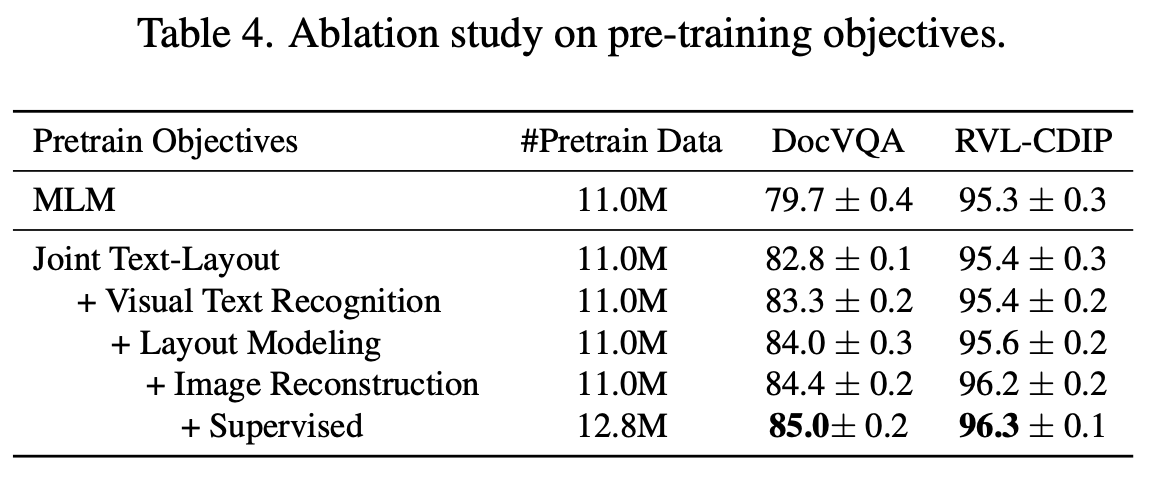
-
UDoP는 8가지 task에서 SOTA를 내는 Document AI의 Foundation model임
3. UDoP
-
Overall Diagram
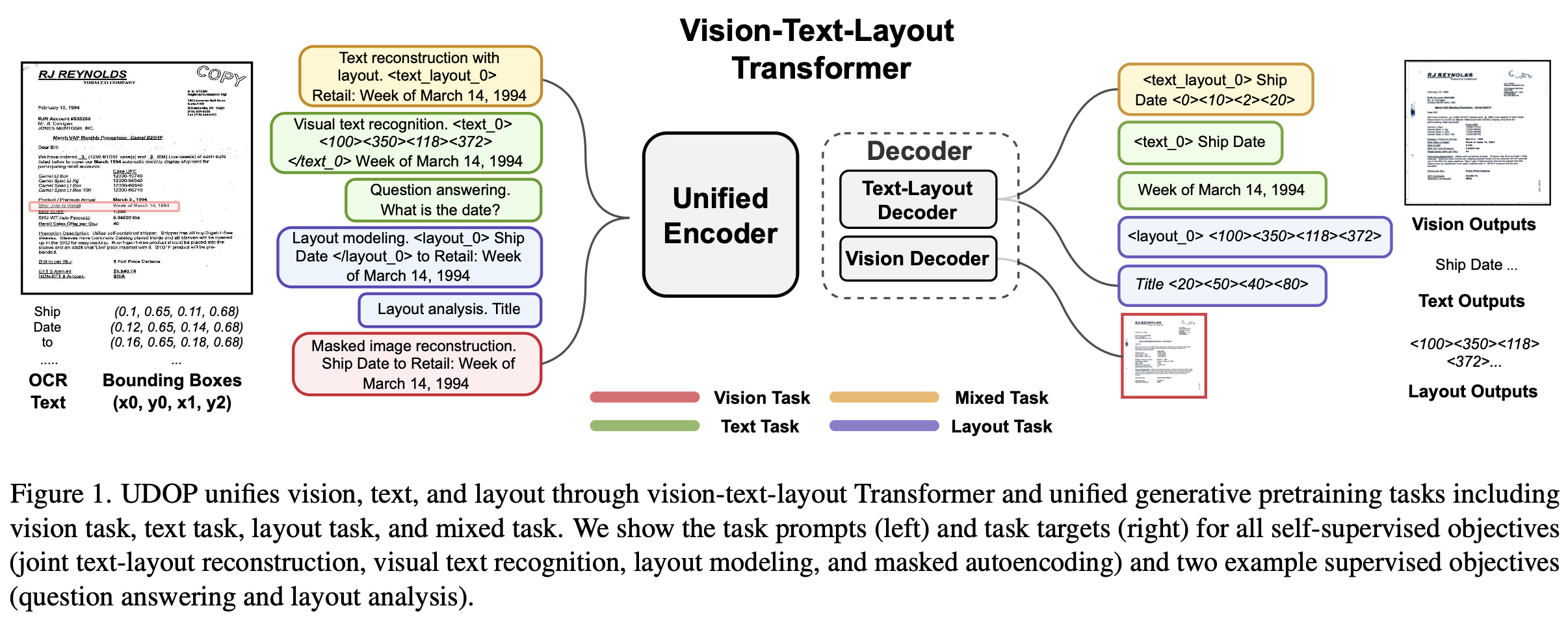
-
Given

-
Image v

-
text tokens ${s_i}$ : OCR이 생성
-
bounding boxes ${x_i^1, y_i^1, x_i^2, y_i^2}$ : OCR이 생성
-
M: Document내에 존재하는 (ocr이 예측한) word의 수
-
-
3.1 A Unifired Visual, Text, and Layout Encoder
-
Document AI는 document 안에 text가 존재하므로, text와 해당 text가 존재하는 image region이 1:1 매칭이 가능하다
-
image patch

- P: Patch의 갯수
- D: embedding dimension
-
word token

-
layout-induced vision-text embedding
- 해당 이미지 영역의 patch를 만들어 text embedding과 함께 추가로 사용한다.

-
추가된 입력을 encoding하는 modality-agnostic encoder를 도입한다.

-
image만 존재하고, text가 존재하지 않는 영역은, image patch 그대로 활용한다.

-
-
T5와 마찬가지로 text의 token position으로 2D relative attention bias을 준다.
3.2 Vision-Text-Layout Decoder
-
VTL Decoder의 목적은 text, layout, 그리고 image를 모두 생성하는 것이다.
- Text-Layout Decoder: sequence-to-sequence manner로 text와 layout을 생성
- Layout의 경우, vocabulary화 하기위해 해당 normalized bbox coordinate를 vocabulary size로 descritize를 수행함
- (0.1, 0.2, 0.5, 0.6), vocabulary-size=500 $\to$ <50><100><250><300>
- Layout의 경우, vocabulary화 하기위해 해당 normalized bbox coordinate를 vocabulary size로 descritize를 수행함
- Vision Decoder: MAE의 decoder를 사용
$\to$ 두 decoder 모두 VTL encoder와 cross-attention을 수행
- Text-Layout Decoder: sequence-to-sequence manner로 text와 layout을 생성
3.3 Unified Generated Pretraining
-
라벨 스펙 등이 다양한 Document AI의 학습 목적을 통합하기 위해 universal generative task format with task prompt를 제안함
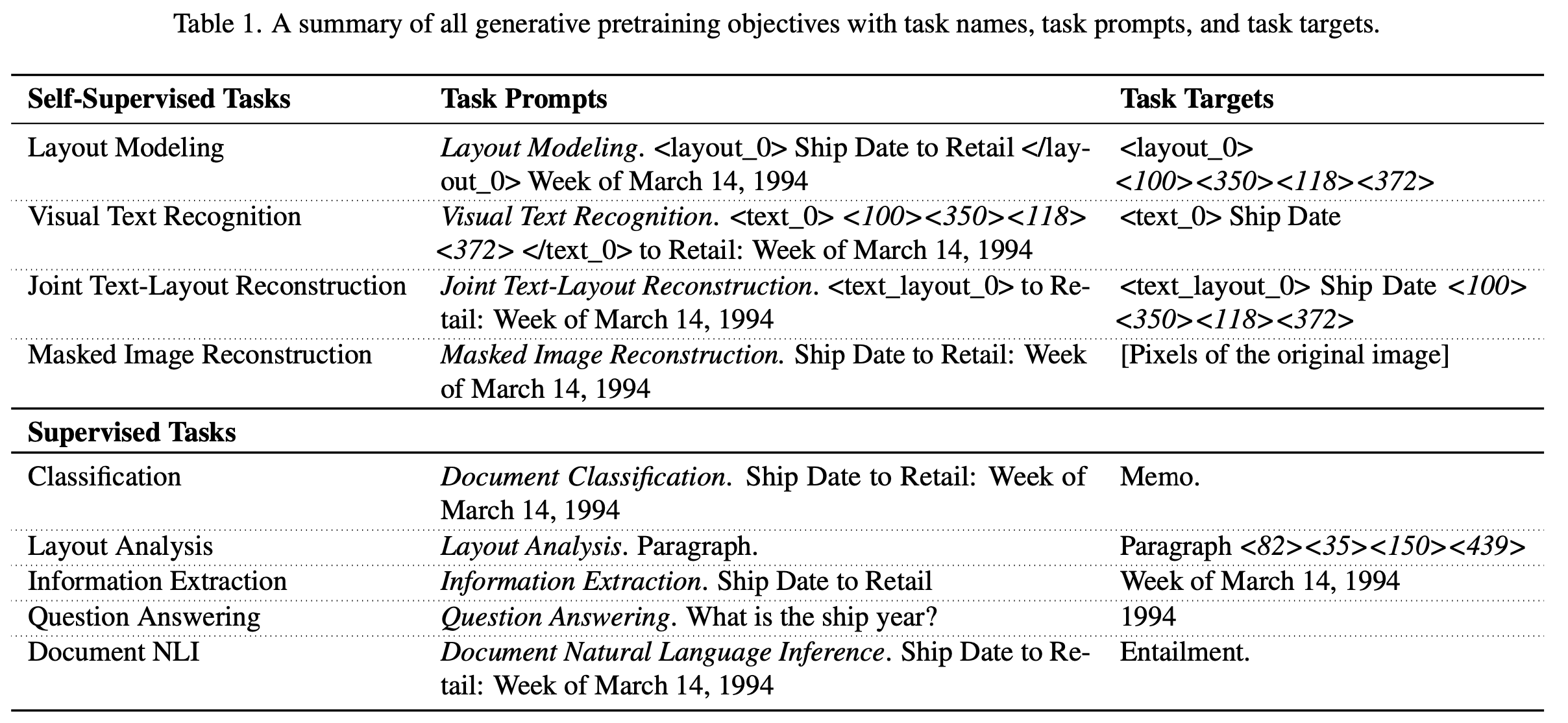
Self-supervised pretraining task
- OCR engine을 가동해 document image, text, 그리고 해당 bbox (layout)을 가지고 있음
-
Joint Text-layout Reconstruction
- 일정 ratio로 text를 masking하고, masking된 text와 해당 bbox 영역을 예측하는 task $\to$ masking ratio 15% 사용
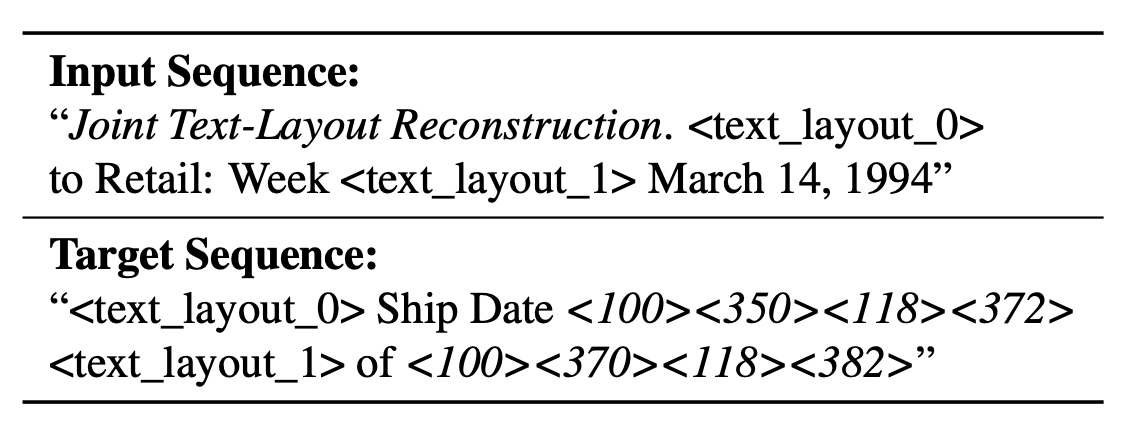
- text_layout_0, text_layout_1 : text-layout sentinel tokens
- <100><350><118><372>: “Ship Date” text가 위치한 layout (bbox)
-
Layout Modeling
-
Layout만 예측하는 task $\to$ 높은 masking ratio 사용 (75%)
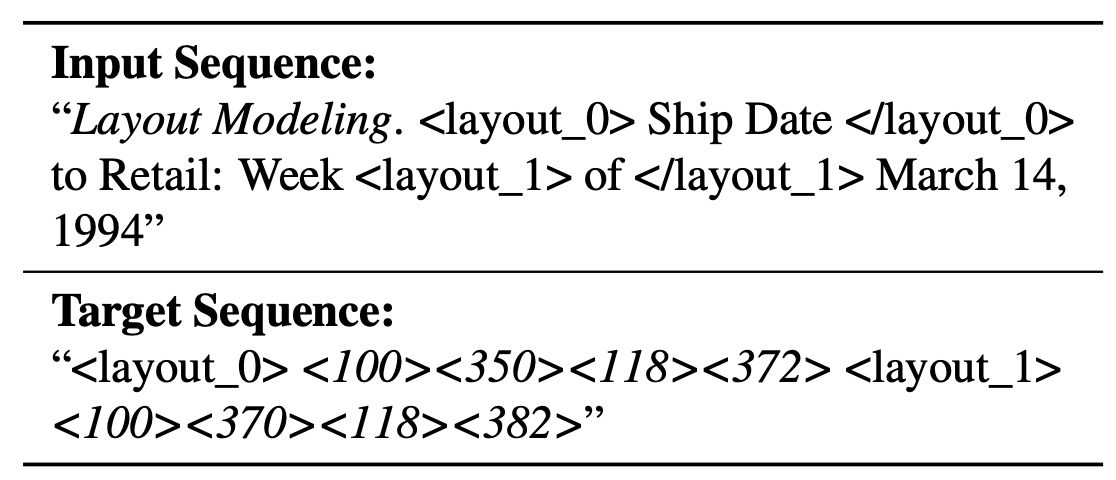
-
-
Visual Text Recognition
-
주어진 location의 text를 예측하는 업무 수행 $\to$ masking ratio 50% 사용
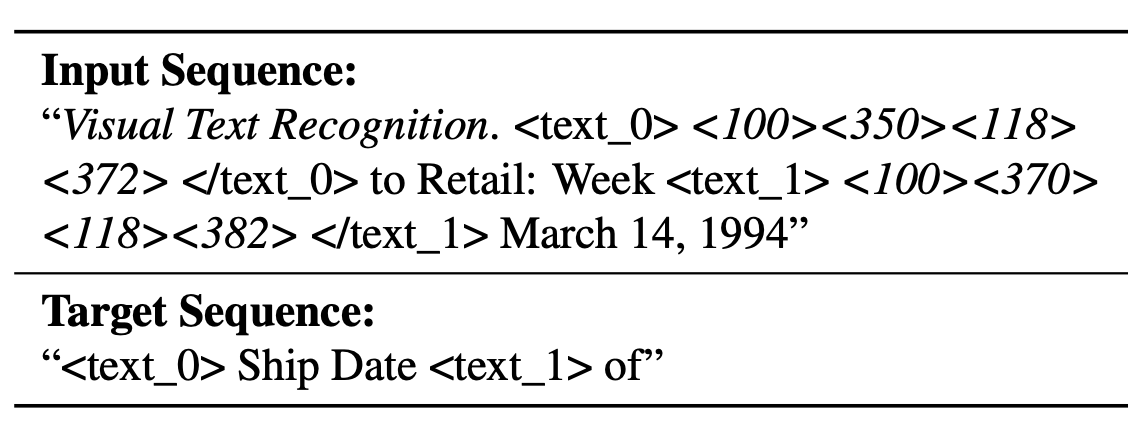
-
-
Masked Image Reconstruction with Text and Layout
-
Masking된 image patch를 복원하는 task
-
OCR engine이 출력한 text 정보와 unified encoder 중 unmasked image patch간의 cross-attention을 수행
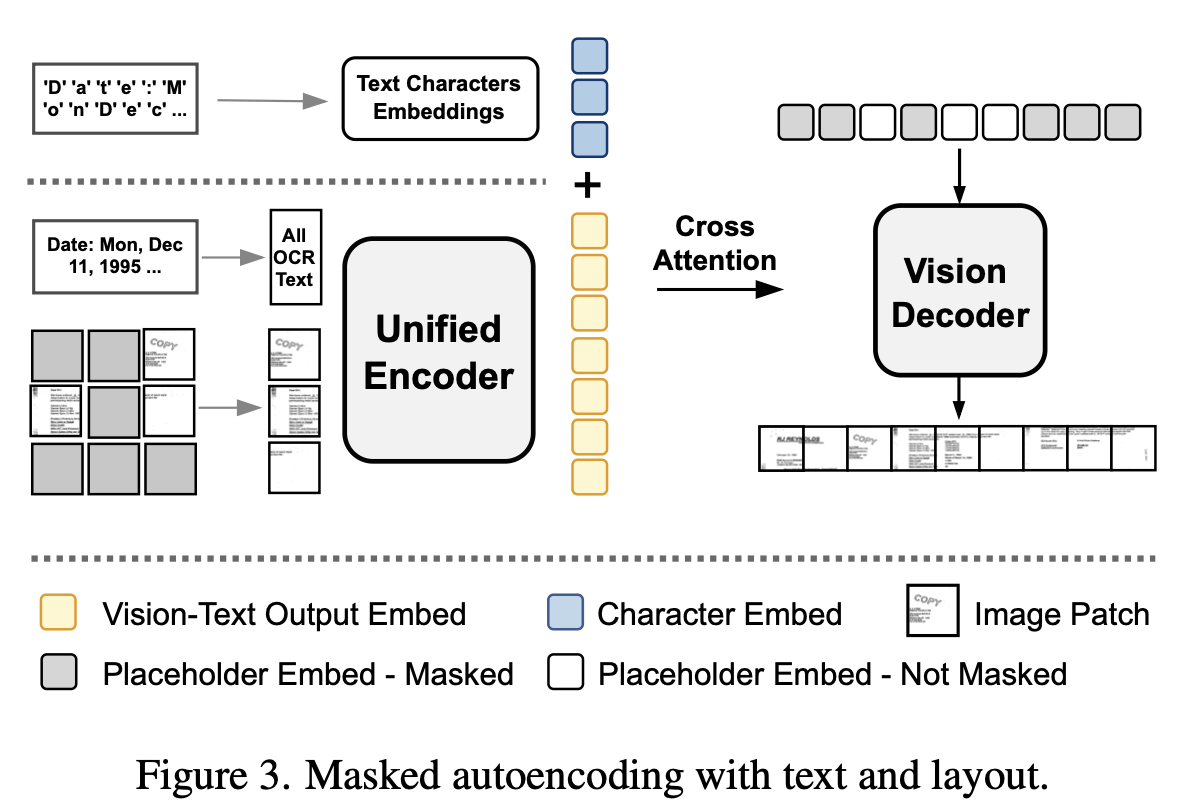
-
3.4 Supervised Pretraining Task
- Label spec이 다양한 open dataset을 활용하여 fine-grained model supervision 역할 수행
-
Classification
-
RVL-CDIP dataset을 사용
-
Document의 카테코기를 분류하는 task (class : 16개)
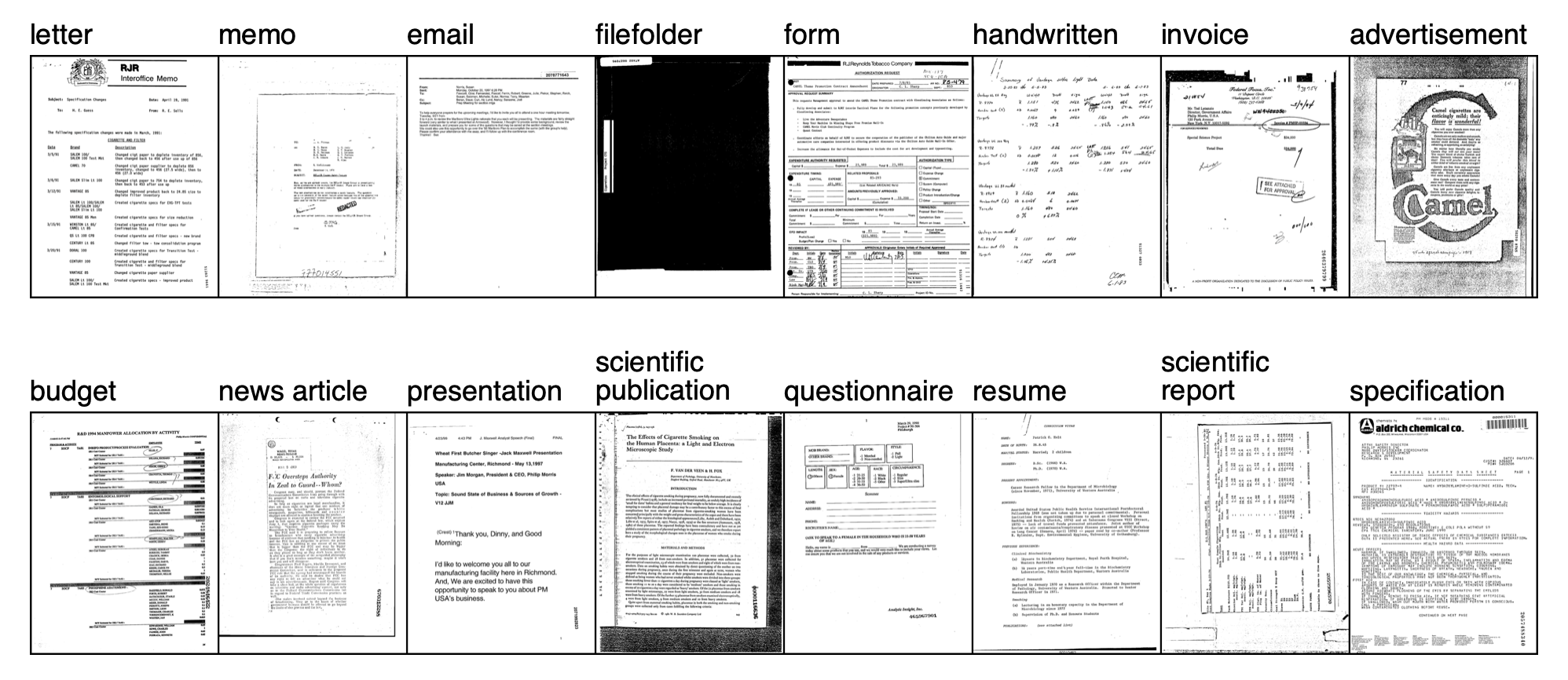
-
-
Layout Analysis
-
PubLayNet dataset을 사용
-
Entity의 bbox를 추출하는 task
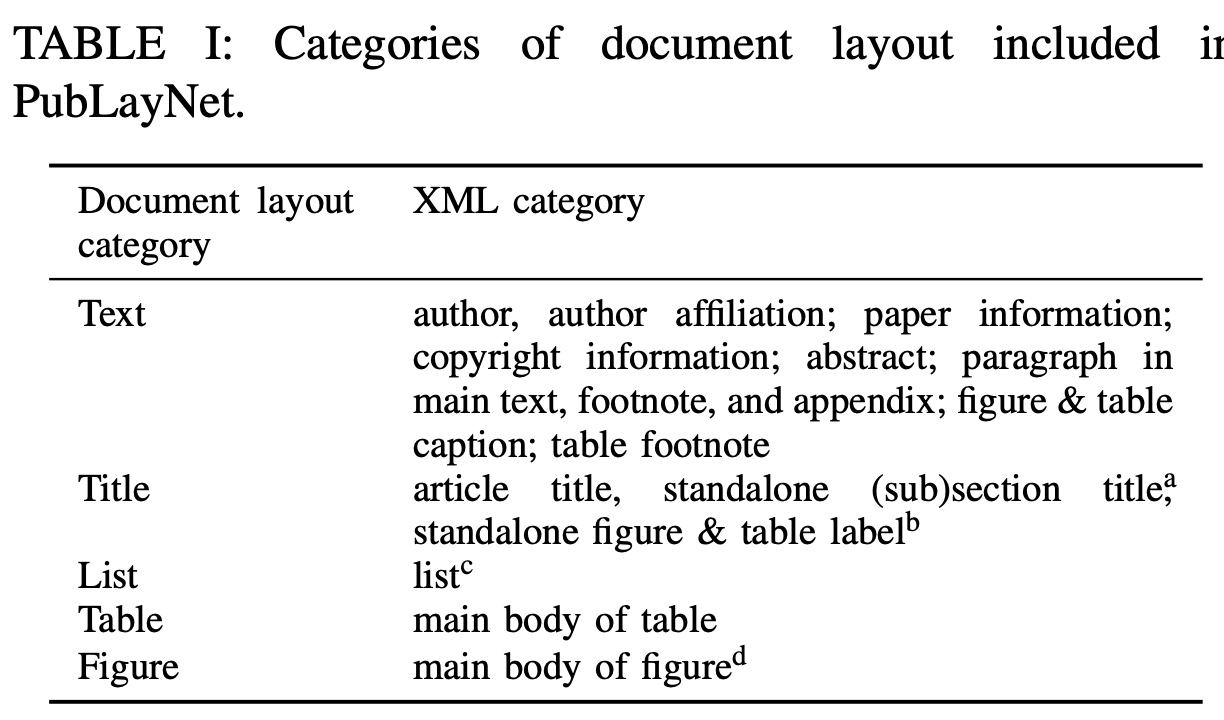
-
-
Information Extraction
- Target entity의 label과 bbox를 예측
- DocBank, Klesiter Charity, PWC, DeepForm dataset을 사용
-
Question Answering
- Question에 대한 Answer를 예측
- WebSRC, VisualSRC, DocVQA, Infographics VQA, WTQ(Wiki Table Quesitons) dataset 사용
-
Document NLI (Natural Language Inference)
- 두 text간의 Entailment(수반) 여부를 이진분류하는 task
- TabFact dataset 활용
4. Experiments
-
Text tokenizer : T5 tokenizer 활용
-
Curriculum learning
- image & layout reconstruction을 위해 high-resolution image 사용이 불가피
- 초기부터 high-resolution으로 학습하면 시간이 너무 오래걸림
- 256 $\to$ 512 $\to$ 1,024 resolution으로 점차적으로 해상도를 높여가며 학습
-
DUE-Benchmark (Document Understanding Evaluation benchmark)
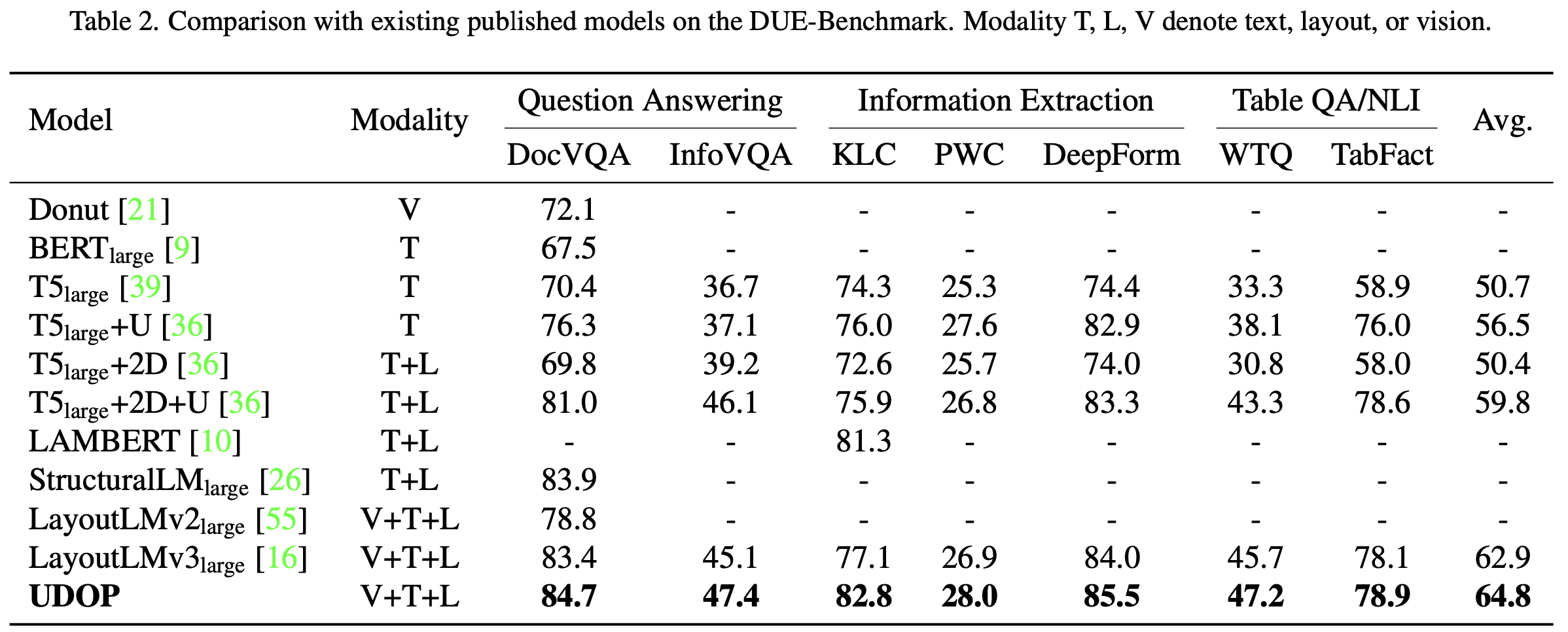
-
FUNSD, CORD, RVL-CDIP의 Semantic Entity Recognition
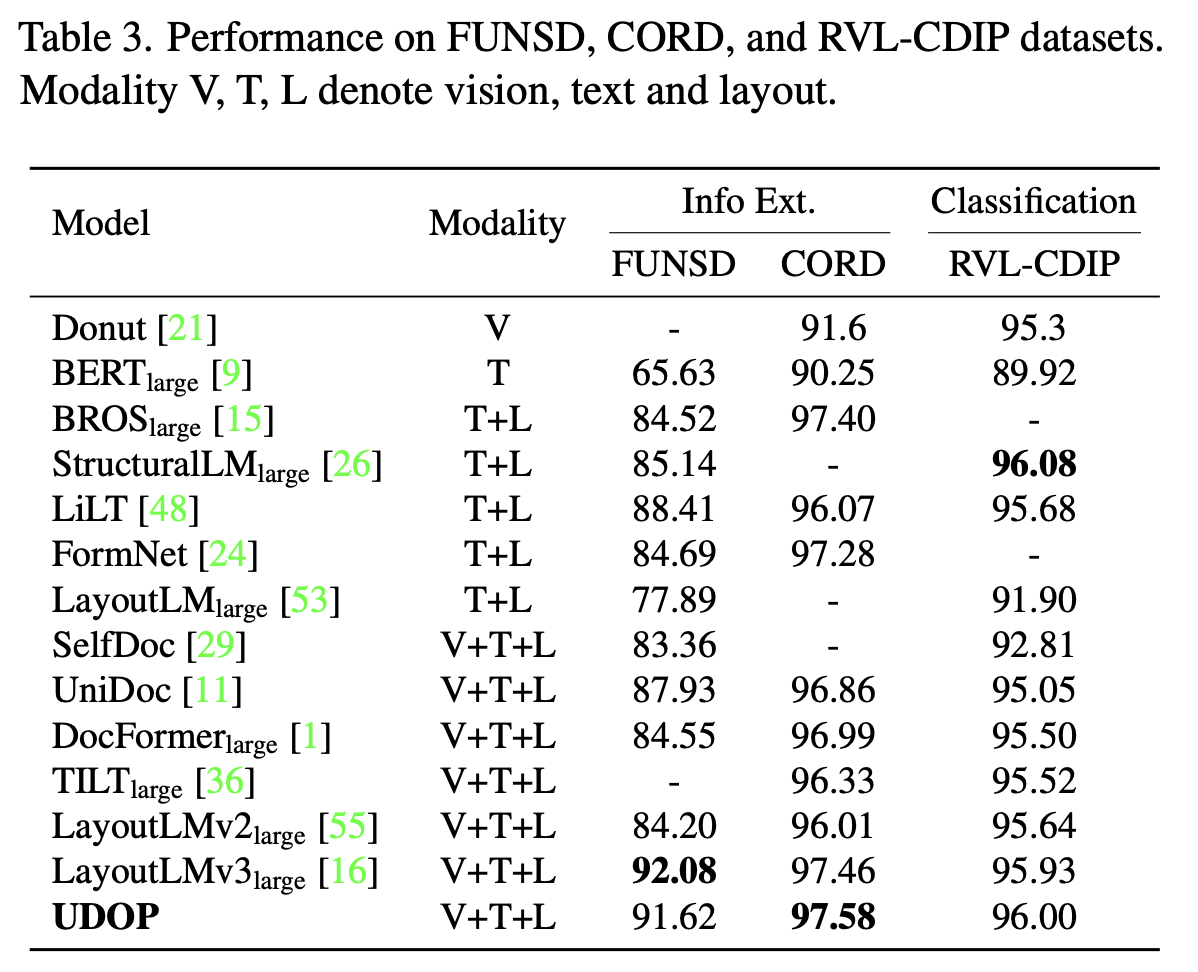
-
Document Generation & Editing
-
Image reconstruction의 cross-attention에 사용되는 text prompt를 edit하여 이미지를 생성
-
Reconstruction Result
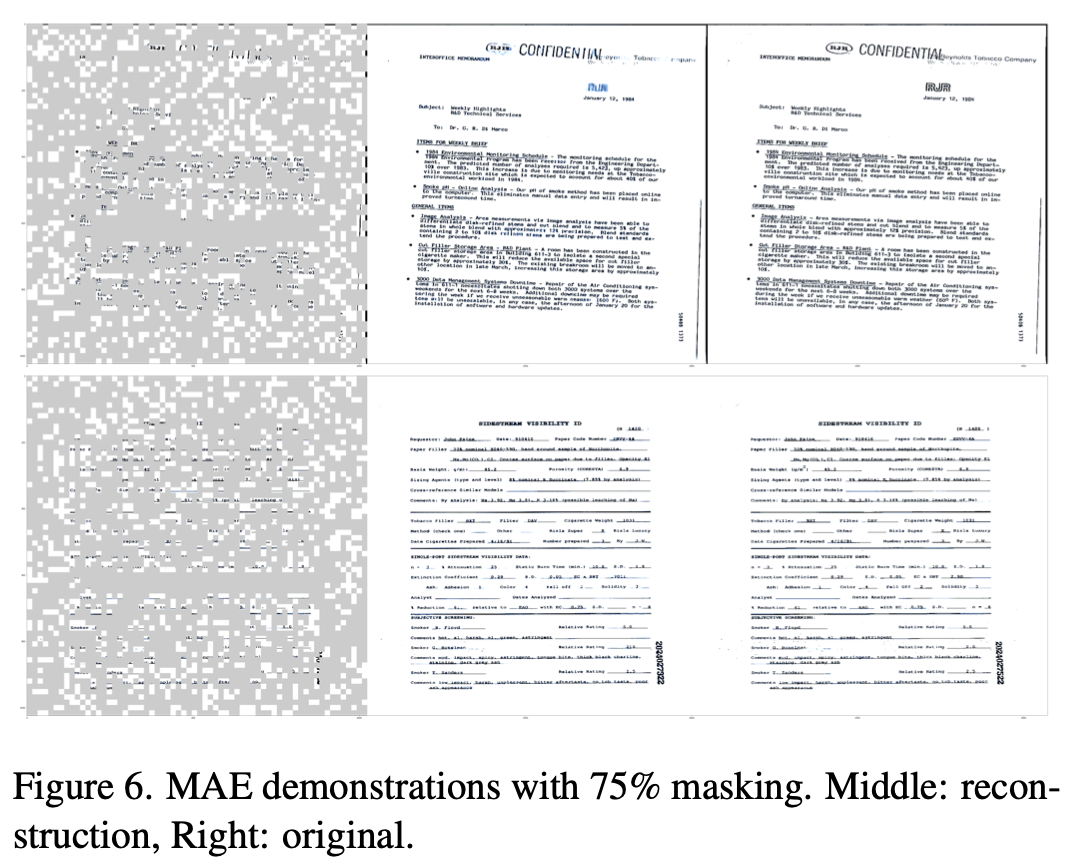
-
Editing Result
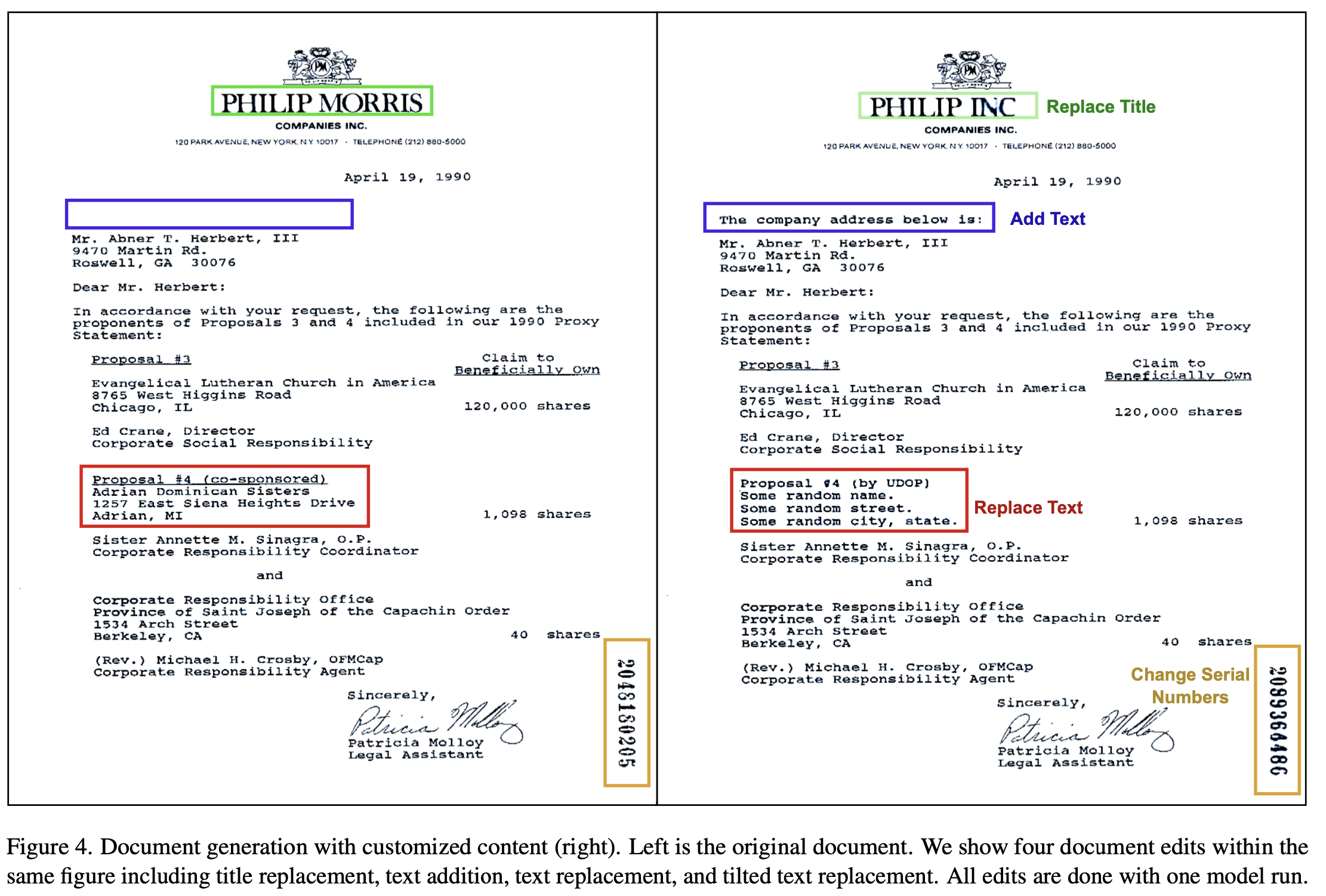
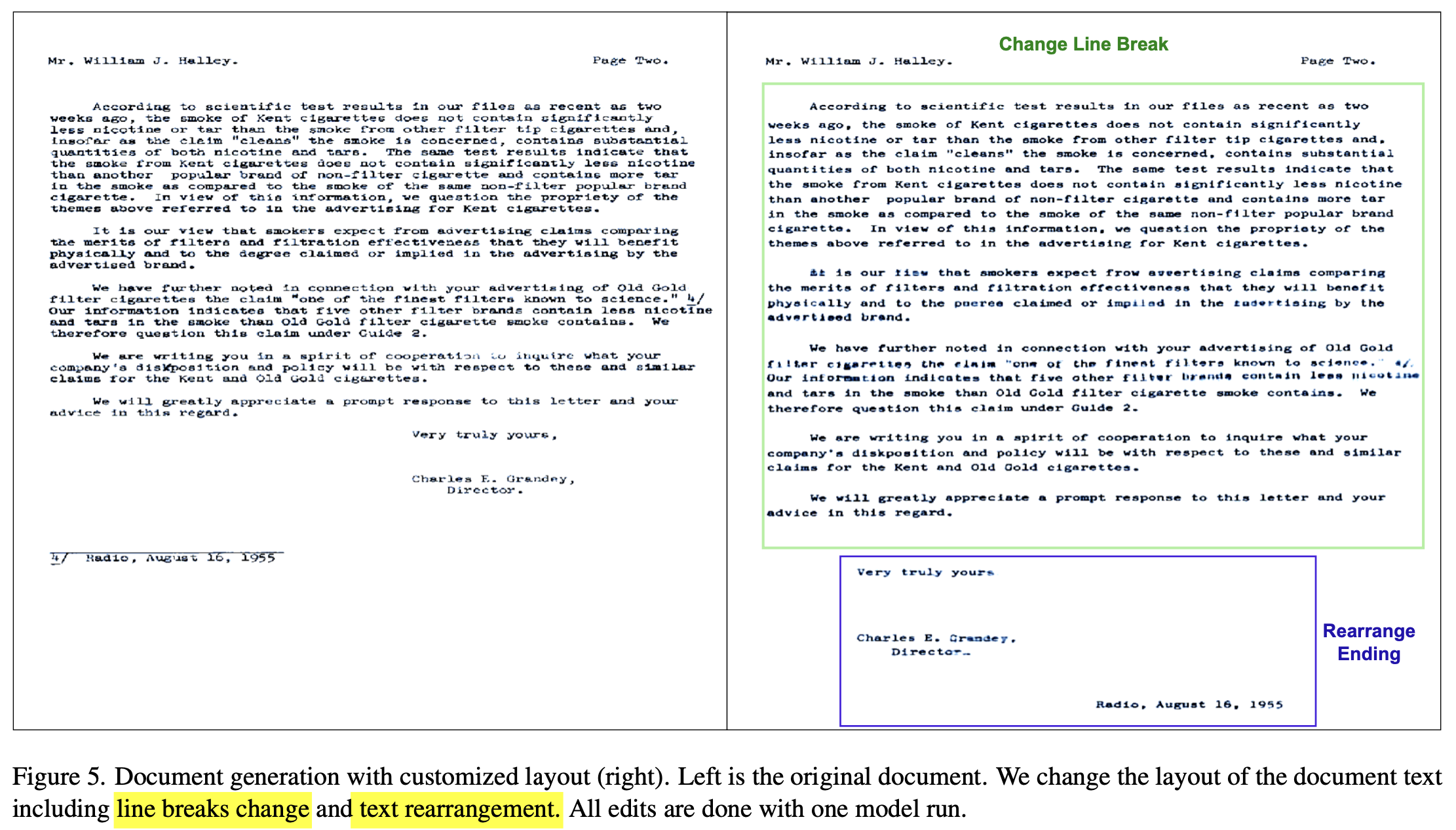
-
-
-
Ablation
-
Pretraining loss & dataset 분석
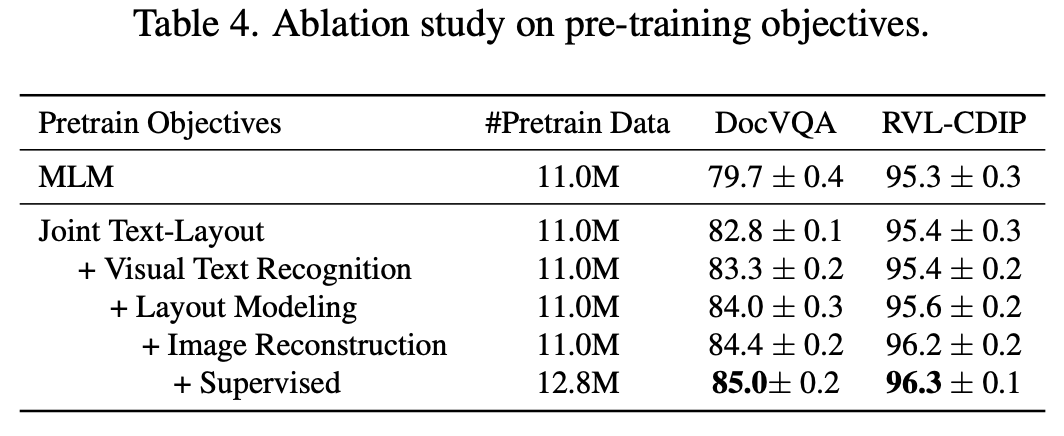
-
-
Dual vs Single tower encoder

-
TiLT auxiliary training 적용 전/후
- auxiliary training : 매우 큰 QA dataset (SQuAD)에 pretraining 후 DocVQA, Inforgraphics VQA에 finetuining
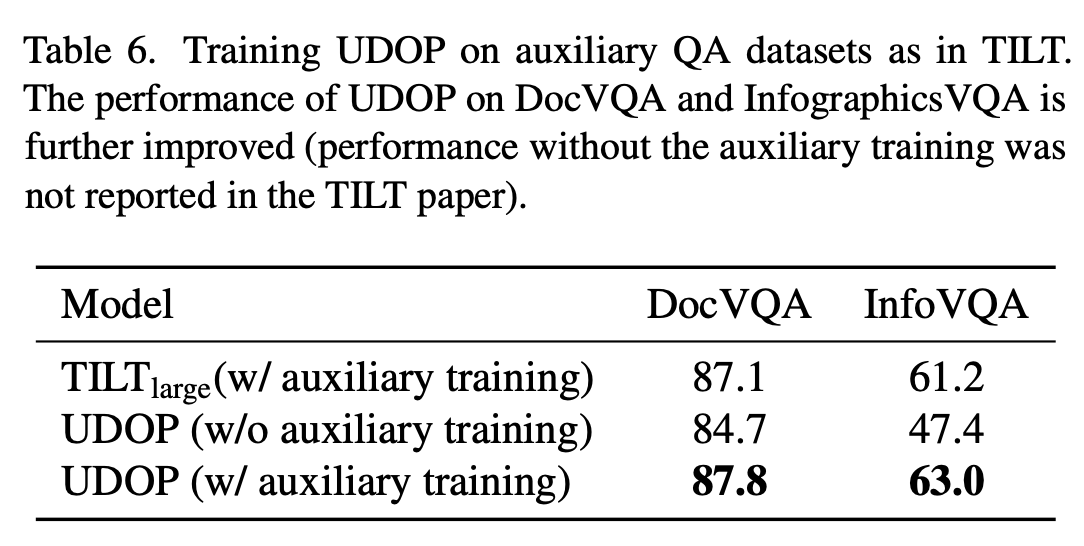
-
Vision modality에 따른 분석
- visually rich (Infographics VQA)한 문서에 visual modality가 더 큰 성능 향상에 기여
